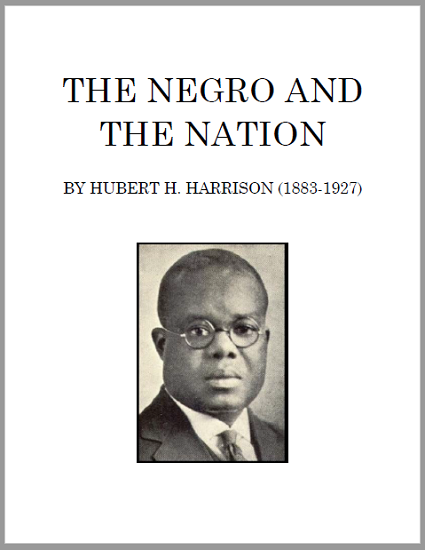| The Negro and the Nation by Hubert H. Harrison (1917)—PDF |
|---|
| www.studenthandouts.com ↣ Printable Texts and eBooks ↣ Nonfiction eBooks and Workbooks |
 |
   |
|
This PDF eBook, 51 pages in length, features the complete text of Hubert H. Harrison's classic 1917 book on his views regarding the political needs of African Americans.
Click here to download or print (PDF file). Excerpt: Under the old system the capitalist owned the man; today he owns the tools with which the man must work. These tools are the factories, the mines, and the machines. The system that owns them owns you and me and all the rest of us, black, white, brown, red, and yellow. We can't live unless we have access to these tools, and our masters, the capitalists, see to it that we are separated from what we make by using these things, except so much as is necessary to keep us alive that we may be able to make more—for them. This little bit is called wages. They wouldn't give us even that if they thought that we could live without it. In the good old days the chattel-slave would be fastened with a chain if they thought that he might escape. Today no chain is necessary to bind us to the tools. We are as free as air. Of course. We are free to starve. And that chain of the-fear-of-starvation binds us to the tools owned by the capitalist as firmly as any iron chain ever did. And this system doesn't care whether the slaves who are bound in this new way are white or black. To the capitalist system all workers are equal—in so far as they have a stomach. Now the one great fact for the Negro in America today is Race Prejudice. The great labor problem with which all working-people are faced is made harder for black working-people by the addition of a race problem. I want to show you how one grows out of the other and how, at bottom, they are both the same thing. In other words, I want you to see the economic reason for race-prejudice. In the first place, do you know that the most rabid, Negro-hating, southern aristocrat has not the slightest objection to sleeping in the same house with a Negro—if that Negro sleeps there as his servant? He doesn't care if his food is prepared by a Negro cook and handled by a Negro waiter before it gets to him; he will eat it. But if a Negro comes into the same public restaurant to buy and eat food, then, Oh my!, he gets all het up about it. But why? What's the difference? I will tell you. The aristocrat wants the black man to feel that he is on a lower level. When he is on that level he is "in his place." When he is "in his place" he is liked. But he must not be allowed to do anything to make him forget that he is on this lower level; he must be kept "in his place", which means the place which the aristocrat wants him to keep. You see, the black man carries the memory of slavery with him. Everybody knows that the slaves were the exploited working-class of the South. That put them in a class by themselves, down at the bottom, downtrodden, despised, "inferior." Do you begin to see now that Race Prejudice is only another name for Caste Prejudice? If our people had never been slaves; had never been exploited workers, and so, at the bottom of the ladder, there would be no prejudice against them now. In every case where there has been a downtrodden class of workers at the bottom, that class has been despised by the class that lived by their labor. Do you doubt it? Then look at the facts. If you had picked up a daily paper in New York in 1848 you would have found at the end of many an advertisement for butler, coachman, lady's maid, clerk or book-keeper these words: "No Irish need apply." There was a race-prejudice against the Irish then, because most of the manual unskilled laborers were Irish. They were at the bottom, exploited and despised. But they have changed things since. Beginning in the seventies when Jewish laborers began to come here from Russia, Austria and Germany, and lasting even to our own day, there has been race-prejudice against the Jews. And today when the Italian has taken the place which the Irish laborer vacated—at the bottom—he, too, comes in for his share of this prejudice. In every one of these cases it was the condition of the people—at the bottom as despised, exploited, wage-slaves—that was responsible for the race-prejudice. And it is just so in the black man's case, with this difference: that his color marks what he once was, and even though he should wear a dress suit every evening and own an automobile or a farm he can always be picked out and reminded. Now, under the present system, exploiting the wage-slave is respectable. I have already shown you that wherever the worker is exploited he is despised. So you will see that despising the wage-slave is quite fashionable. You may recall the name of the great capitalist who said, "the public be damned." He was only a little more outspoken than the rest of his class. As long as the present system continues, the workers will be despised; as long as the workers are despised, the black men will be despised, robbed and murdered, because they are least able to defend themselves. Now ask yourself whether you haven't a very special interest in changing the present system. Of course, you will ask: "But haven't white working people race-prejudice too?" Sure, they have. Do you know why? It pays the capitalist to keep the workers divided. So he creates and keeps alive these prejudices. He gets them to believe that their interests are different. Then he uses one half of them to club the other half with. In Russia when the workingmen demand reform the capitalists sic them on the Jews. In America they sic them on the Negroes. That makes them forget their own condition: as long as they can be made to look down upon another class. "But, then," you will say, "the average wage-slave must be a chump." Sure, he is. That's what the capitalist counts on. And Socialism is working to educate the workers to see this and to unite them in doing away with the present system. Socialism stands for the emancipation of the wage-slaves. Are you a wage-slave? Do you want to be emancipated? Then join hands with the Socialists. Hear what they have to say. Read some of their literature. Get a Socialist leaflet, a pamphlet, or, better still, a book. You will be convinced of two things: that Socialism is right, and that it is inevitable. It is right because any order of things in which those who work have least while those who work them have most, is wrong. It is inevitable because a system under which the wealth produced by the labor of human hands amounts to more than two hundred and twenty billions a year while many millions live on the verge of starvation, is bound to break down. Therefore, if you wish to join with the other class-conscious, intelligent wage-earners—in putting an end to such a system; if you want to better living conditions for black men as well as for white men; to make this woeful world of ours a little better for your children and your children's children, study Socialism—and think and work your way out. |
| www.studenthandouts.com ↣ Printable Texts and eBooks ↣ Nonfiction eBooks and Workbooks |














































